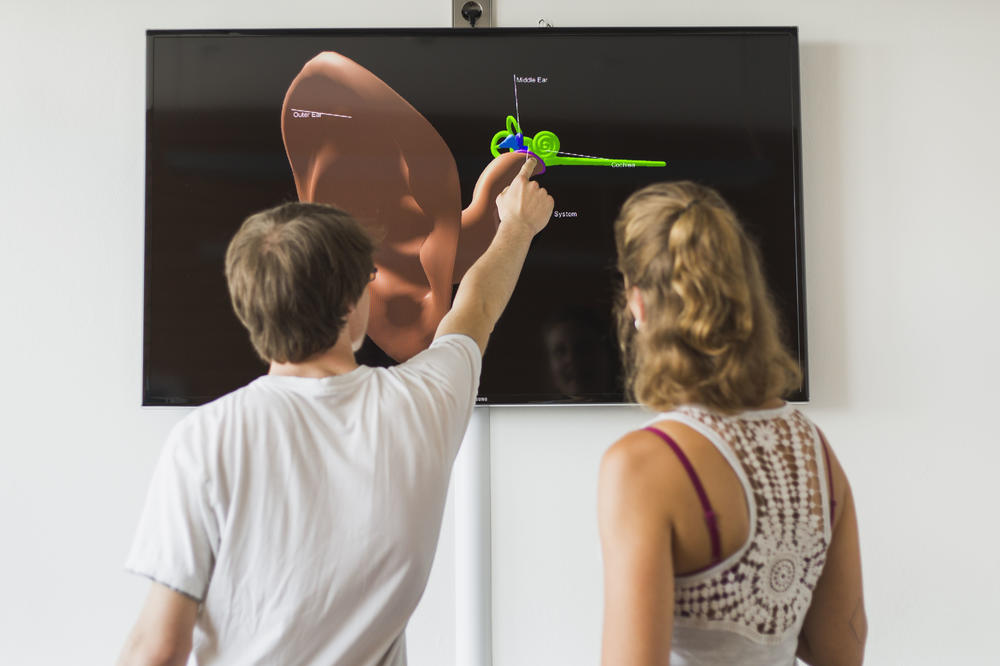Of Hearsay and Knowledge
Digital networks change our lives and society. A joint computer science and media degree program explores the points of intersection between technology and society.
Jun 13, 2017
How can communication with voice control systems such as Siri be improved? Facial robots can be used to improve the dialogues through additional interactions such as eye contact or head shaking.
Image Credit: TU Berlin/PR/Oana Popa
Recent years have seen ever-increasing use of “fake news” to influence political sentiment. An example was the “Lisa case,” the incident of a 13-year-old Russian girl allegedly raped by refugees in Berlin at the beginning of 2016. The fabricated story spread over social media and led to angry demonstrations in the German capital and even strained diplomatic ties between the Russian and the German foreign ministers. “In such cases, the new technical possibilities opened up by digital communication create huge potential for conflict,” says Martin Emmer, at professor at the Institute for Media and Communication Studies at Freie Universität Berlin. “Large numbers of previously passive readers and consumers are turning into active disseminators of news.” Such points of intersection between social and technical aspects are increasingly important and are a subject of academic inquiry in computer science and media studies.
The Faculty of Electrical Engineering and Computer Science at Technische Universität Berlin and the Institute for Media and Communication Studies within the Department of Political and Social Sciences at Freie Universität Berlin offer a joint, German-language bachelor’s program in computer science and media (Medieninformatik). Graduates from the degree program, which was launched three years ago, receive a degree certificate from both universities.
Course Content: Computer Science, Technology, Communication Studies, and Media Law
“Demand was strong from the outset, and we’ve had very good experience with the new degree program,” says Emmer, who heads the program together with Sebastian Möller, a professor of electrical engineering at Technische Universität Berlin. The program can accept 60 students each semester. Most recently, Emmer says, the number of applications was ten times that. “The logical next step after the successful launch is for us now to go on and offer a master’s degree.” The master’s program is being provided in collaboration with a new partner, the Faculty of Law at Humboldt-Universität. The program combines mathematics, fundamentals of computer science, and media technology with social science approaches to media communication. Technische Universität Berlin is responsible for the computer science and technology component, Freie Universität for the communications studies and economics-related content, while Humboldt-Universität teaches media law content covering areas such as commercial intellectual property law, licensing agreements, and rights of personality. Students are also able to attend courses at the Konrad Wolf Film University in Babelsberg.
Learning with interactive media: Using a model of the ear, students in the degree program on media informatics illustrate the process of listening.
Image Credit: TU Berlin/PR/Oana Popa
“What’s special about computer science and media in Berlin is the amount of social science analysis built into the degree program,” Emmer explains. “Throughout the entire program, students alternate between acquiring technology-related and communication/social studies knowledge and skills, and all the elements are closely interconnected.” This enables students not only to develop and implement digital media applications, but to analyze their effects and make inferences from that analysis. Key skills like project management and team working likewise feature on the timetable. What’s more, thanks to the three universities’ outstanding international connections and exchange programs, undergraduates in the program can further widen their horizons by incorporating a study period abroad. “We were positively surprised by the amount of prior knowledge students have even in the first semester. Many have already done some programming for fun at school,” says Emmer. “Many of the projects produced by the students in the last semester before their finals were quite ambitious.”
Student Research Projects
Tomasz Tkaczyk, for example, a sixth semester computer science and media undergraduate, is working with fellow students on a research project targeting fake news. “Germany already has a growing fact-checking community that picks up on rumors online,” says Tkaczyk. “But what is missing is an easy way to track the spread of fake news, and that is what we’re working on.” With the aid of communication scholar Christoph Raetzsch, Tkaczyk’s group at Freie Universität Berlin’s Division of Journalism Studies is developing a tool that will mainly be of use to journalists but could also interest politicians: www.fakenewsgraph.de aims to show who launched a given item of fake news and who it was disseminated through. The object of enquiry consists of data from Twitter.
The Fake News Graph Analysis project is already making waves off campus, too. On 1 June 2017, Tkaczyk’s group presented their work at the #DisruptPopulism conference in Berlin, where 15 teams from five different countries competed for an award including 15,000 euros. “We didn’t win but we did get great encouragement to keep going,” says Tkaczyk, who is now applying for the master’s program. “Dr. Christoph Raetzsch at Freie Universität’s Division of Journalism Studies helped us find the right idea at the right time. He gave us tremendous motivation, and the group worked together really well. I learned a lot from the project.”
Graduates with master’s degrees have a wide range of career options. Opportunities are open to them in new media companies and also in traditional sectors where digital media skills are increasingly in demand – such as in television and the automotive industry. “People with this kind of expertise are also sought after in the academic world,” Emmer stresses. “For example, big data is a major upcoming issue in research.”
In Berlin, there is little distance separating computer science and media studies from other areas of inquiry surrounding digitalization. An example is the nearby Einstein Center Digital Future opened in early April. The new center will be home to 50 new professorships across the core area of digital infrastructure, methods, and algorithms and extending to innovation focuses including digital health, the digital society, and social sciences, and digital industry and services. A further addition will be the German Internet Institute that is to be established in the German capital with up to 50 million euros a year in funding for the first five years from the German Federal Ministry of Education and Research. “The research entities here in the city add up to an exciting cluster,” says Emmer. “That makes Berlin a trailblazer in research related to digitalization.”


